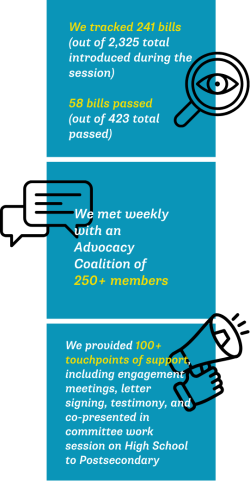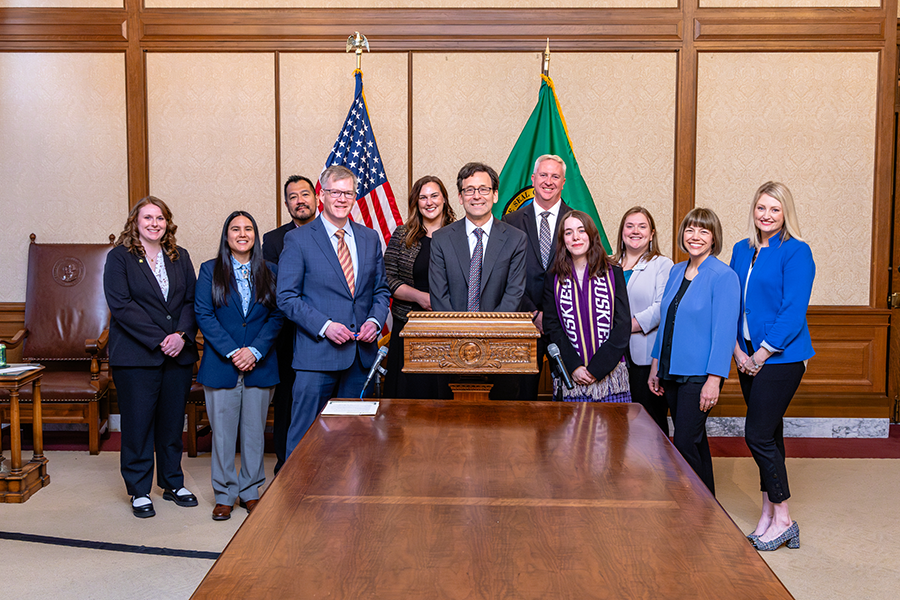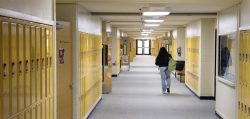2025 Legislative Session Recap
Delayed child care access, defunded career-connected learning, and an unprecedented budget shortfall.
It’s a difficult time for public education.
As we settle into the legislative interim, our team is taking a moment to reflect and fully digest the outcomes of this year’s session. It was a season of loss in so many ways. With the massive budget shortfall, our lawmakers made tough decisions that directly affect students and families. At the same time, our community of lawmakers and advocates grieved the legislators who passed away this year.
Despite the challenges, Washington STEM remains committed to serving students by driving systems-level change. Our path forward begins with understanding how new policies and budget decisions will shape the education experiences of students and families across our state.
Let’s break down the key decisions and budget outcomes from a challenging 105-day legislative session—as well as federal implications that could shape what comes next.
Unfulfilled promises in early care and education (ECE)
In 2021, the Fair Start for Kids Act (FSFKA) promised to build a more equitable child care system through improved access, expanded subsidy programs, capped co-pays for families, and support for the child care workforce. This was a $1.1 billion step in the right direction, followed by years of further investments in our state’s ECE system.
Now, a new law (SB 5752) is rolling back that progress by delaying the implementation of the FSFKA, reflecting the difficult trade-offs lawmakers have had to make amid significant budget challenges. Here’s what that looks like:
- Previously, the Early Childhood Education and Assistance Program (ECEAP) was scheduled to be fully implemented by the 2026–27 school year. Now, it has been delayed until the 2030–31 school year.
- Families whose income falls below a certain percentage of the state median income are eligible for the Working Connections Child Care (WCCC) subsidy program. Previously, this eligibility threshold was set to expand from 60% to 75% in 2025 and 75% to 85% in 2027. Those expansions are now being delayed to 2029 and 2031, respectively.
- Co-pays will increase for families participating in WCCC.
Support for child care facilities
There were some wins for our state’s ECE system. The legislature made a nearly $100 million investment in the Early Learning Facilities program. This program provides grant funding to WCCC and ECEAP providers for renovating, purchasing, or constructing child care facilities.
A win for dual credit and career and technical education (CTE)
While our state has made strides to improve dual credit access, administrative barriers still keep high school students from applying their CTE dual credits towards a postsecondary credential. In 2023, only 3% of 56,000 Washington students successfully did so.
Passed into law, HB 1273 builds on the momentum of a 2023 pilot program in the northwest region, which was funded to increase CTE dual credit participation and credential attainment in professional-technical programs.
This work is taking a regional partnership approach to identifying barriers and testing solutions that may ultimately lead to statewide solutions. Among other supports to CTE dual credit, the law will:
- Provide technical assistance to public high schools and postsecondary institutions to improve the accuracy and speed of awarding dual credits and updating transcripts.
- Support high schools’ outreach efforts to students on how to transfer their CTE dual credits to a postsecondary institution.
- Support partnerships between high schools and postsecondary institutions to develop articulation agreements (i.e., an agreement that determines how credits will transfer from one institution to another).
We know that CTE is one of the most easily accessed dual credit options in our state. Continuing this pilot will help us understand statewide solutions to ensure that all Washington students take full advantage of these valuable courses.
Cuts to Career Connect Washington (CCW)
Career-connected learning took a big hit in the 2025–27 budget. The legislature eliminated 83% of CCW’s funding—from $27.5 million to $4.864 million. The remaining 17% is earmarked for the grants that CCW provides to develop career-connected learning programs across the state (RCW 28C.30.050). It won’t cover other essential components of CCW’s work, including Career Launch enrollment for K-12 schools, career and technical colleges, and four-year public universities.
It’s easy to view the impact in terms of remaining dollars going directly into classrooms. In reality, students need both direct support and systems-level infrastructure to thrive. What is clear is that this shortfall affects students and employers who depend on grant-funded support to build and expand career-connected learning programs. These cuts will hit not only schools but also community and technical colleges, universities, apprenticeship programs, labor unions, and community-based organizations.
Given the severity of the cuts to CCW, Washington STEM made the strategic decision to step back from its formal leadership role to maximize resources for our partners (Networks and Sector Leaders). While this reduces our ability to guide implementation and provide technical assistance, we remain committed to supporting the CCW initiative through continued data and measurement efforts.
Facing federal cuts at home
In Washington state, we’re facing significant challenges—tight budgets, delayed access to essential services, and difficult policy decisions. At the same time, turmoil and federal cuts coming out of the “other Washington” threaten to intensify these struggles here at home. And it’s not just the efforts to dismantle the Department of Education, attacks on colleges and universities, and the defunding of early care, expanded learning, and education programs.
Congress has passed the Federal budget legislation, and the President signed this megabill into law. For Washington State, we’re looking at billions of dollars of cuts across education, healthcare, energy, workforce, and more. The cuts to Medicaid (Apple Health) are in the 10s of billions of dollars over the next decade. Governor Ferguson, in a statement released July 3, “estimates Washington will lose between $31 billion and $51 billion in federal Medicaid dollars over the next 10 years, or at least $3 billion per year.”
 At least 250,000 Washingtonians will lose Medicaid coverage. In addition, “as many as 150,000 Washingtonians will be priced out of the state’s health care exchange.”
At least 250,000 Washingtonians will lose Medicaid coverage. In addition, “as many as 150,000 Washingtonians will be priced out of the state’s health care exchange.”
As lawmakers and state leadership begin to grapple with these impacts in anticipation of next year’s supplemental budget, we need to understand what these challenges mean for our communities, schools, and families—and how Washington can and will respond.
Our path forward—together
We’ve seen what works. We know that targeted investments can yield small but powerful shifts that inform broader changes. These changes benefit all learners in Washington state.
Our students aren’t going away. They still need us to advocate for and with them. Here are my questions for legislators and advocates: Where do we go from here? What do you envision for the future of education in Washington?
At Washington STEM, our vision is unchanged. We will continue to tackle the root causes of educational inequity and economic injustice—so that learners in every corner of our state have the necessary resources to become STEM-literate adults ready to step into in-demand, family-sustaining jobs. How we get there depends on the investment of our state’s legislators, industry leaders, and education advocates.
Keep up with us in the interim by joining our Advocacy Coalition. You can also find more legislative session recap materials on our Advocacy page.

